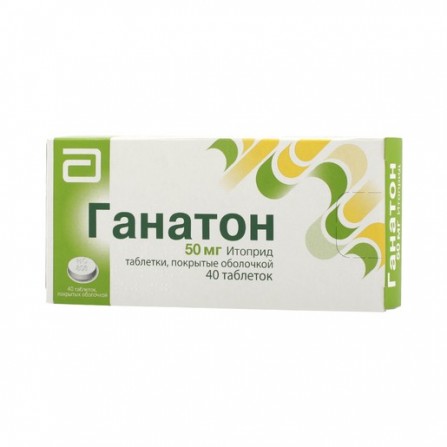Ganaton coated pills 50mg N40
Condition: New product
994 Items
Rating:
Be the first to write a review!

More info
Active ingredients
Itopride
Release form
Pills
Composition
Itopride hydrochloride 50 mg; Excipients: lactose - 34.975 mg (including excess due to weight loss during production - 2.93%), corn starch - 15 mg, carmellose - 20 mg, anhydrous silicic acid - 4 mg, magnesium stearate - 1 mg, hypromellose - 4.4 mg, macrogol 6000 - 0.4 mg, titanium dioxide - 0.2 mg, carnauba wax - 0.025 mg;
Pharmacological effect
A means of stimulating GI motility. Itoprid enhances GI propulsion motility due to antagonism against dopamine D2 receptors and dose-dependent inhibition of acetylcholinesterase activity. Itopride activates the release of acetylcholine and inhibits its destruction.; Itopride has a specific effect on the upper GI tract, accelerates transit through the stomach and improves its emptying. It also has an anti-emetic effect due to interaction with the D2 receptors located in the trigger zone. Itopride caused a dose-dependent suppression of vomiting caused by apomorphine. Does not affect the serum level of gastrin.
Pharmacokinetics
Absorption; Itoprid hydrochloride is rapidly and almost completely absorbed from the gastrointestinal tract. The relative bioavailability of it is 60%, which is associated with the effect of "first pass" through the liver. Food has no effect on bioavailability. After administration of 50 mg of itoprid hydrochloride inside C max is achieved in 0.5-0.75 hours and is 0.28 μg / ml. When you take the drug at a dose of 50-200 mg 3 times / day for 7 days, the pharmacokinetics of the drug and its metabolites were linear, and cumulation was minimal. Binding to 1-acid glycoprotein is less than 15% of total binding.; Actively distributed in tissues (V d 6.1 l / kg) and found in high concentrations in the kidneys, small intestine, liver, adrenal glands and stomach. It penetrates the BBB in minimal quantities. It is excreted in breast milk.; Metabolism; Itoprid undergoes active biotransformation in the liver. Three metabolites have been identified, only one of which exhibits little activity, which has no pharmacological significance (approximately 2-3% of that of itoprid). The primary metabolite is the N-oxide, which is formed as a result of the oxidation of the quaternary amino-N-dimethyl group.; Itopride is metabolized by the action of flavin-dependent monooxygenase (FMO3).The number and effectiveness of FMO isoenzymes in humans may differ depending on the genetic polymorphism, which in rare cases leads to the development of an autosomal recessive state, known as trimethylaminuria (fish odor syndrome). In patients with trimethylaminuria, T 1/2 of itopride increases. According to pharmacokinetic studies in vivo, itopride has no inhibitory or inducing effect on CYP2C19 and CYP2E1. Itoprid therapy does not affect CYP or the activity of uridine diphosphate glucuronysyl transferase.; Excretion; Itotride hydrochloride and its metabolites are excreted mainly in the urine. Renal excretion of itoprid and its N-oxide after a single dose of the drug inside in therapeutic doses in healthy people was 3.7 and 75.4%, respectively.; The final T 1/2 of itoprid hydrochloride is about 6 hours.
Indications
Relief of functional non-ulcer dyspepsia (chronic gastritis), including: abdominal distension; feeling of rapid satiety; pain or discomfort in the upper abdomen; anorexia; heartburn; nausea; vomiting.
Contraindications
Gastrointestinal bleeding, mechanical obstruction or perforation of the gastrointestinal tract; pregnancy; lactation period (breastfeeding); children's age up to 16 years; hypersensitivity to itopride.
Use during pregnancy and lactation
Contraindicated use during pregnancy and lactation (breastfeeding).
Dosage and administration
Is ingested 50 mg 3 times / day. The recommended daily intake is 150 mg. This dose may be reduced based on the age of the patient.
Side effects
From the blood system: leukopenia, thrombocytopenia. From the endocrine system: increased prolactin levels, gynecomastia. From the central nervous system: dizziness, headache, tremor.; From the digestive system: diarrhea, constipation, abdominal pain, increased salivation, nausea, jaundice.; Allergic reactions: skin flushing, pruritus, rash, anaphylaxis.; Changes in laboratory parameters: increased activity of AST and ALT, GGT, ALP and bilirubin level.
Overdose
Cases of overdose in humans are not described.
Interaction with other drugs
Gastrointestinal bleeding, mechanical obstruction or perforation of the gastrointestinal tract; pregnancy; lactation period (breastfeeding); children's age up to 16 years; hypersensitivity to itopride.
special instructions
Caution should be taken with itoprid in patients for whom the occurrence of cholinergic adverse reactions (associated with the increased effect of acetylcholine under the influence of itopride), may aggravate the course of the underlying disease.



